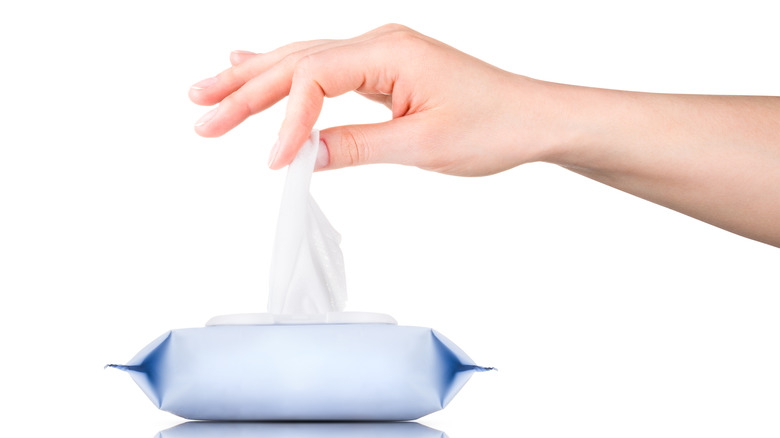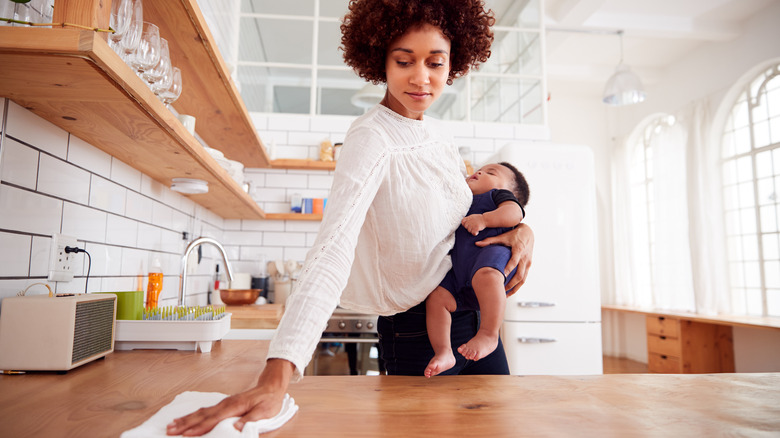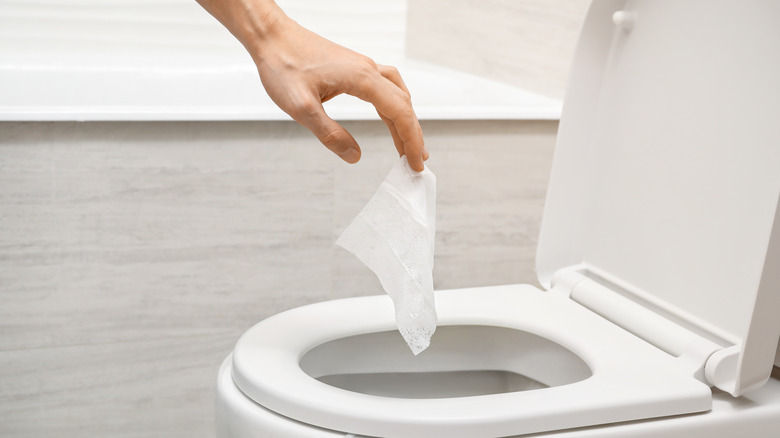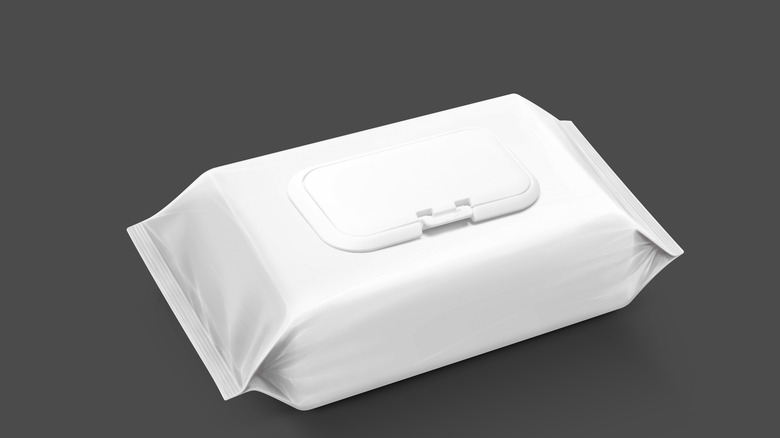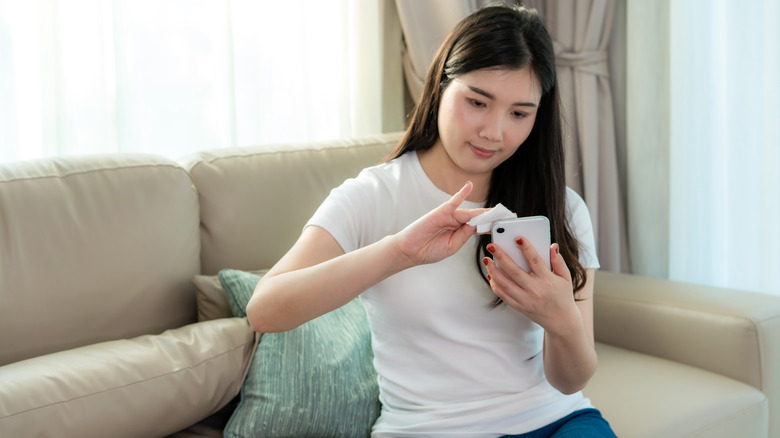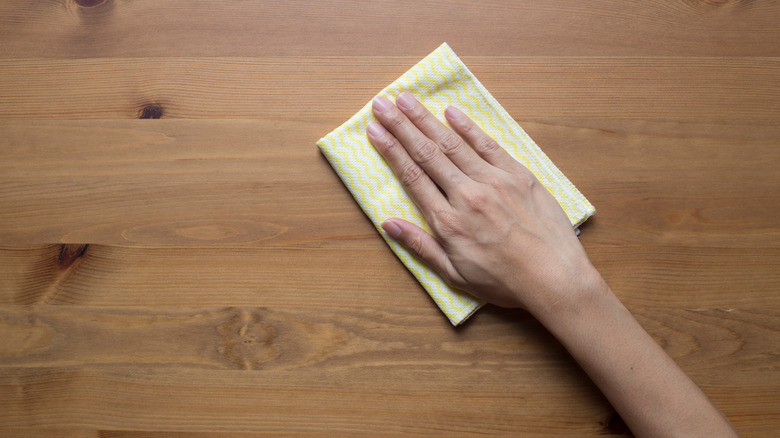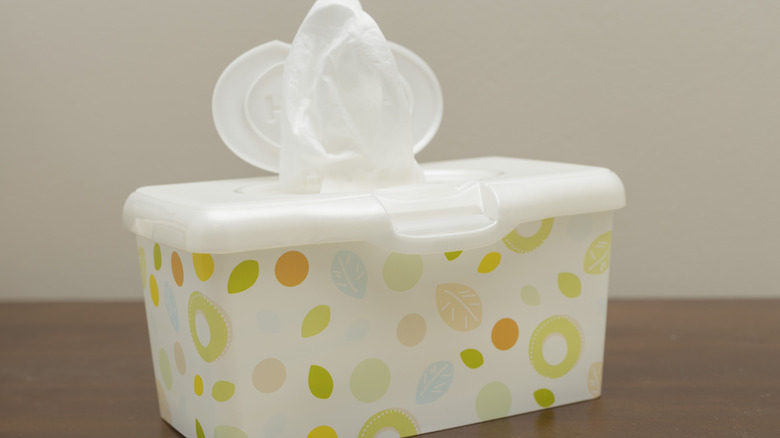The Biggest Mistake You're Making When Cleaning With Baby Wipes
You might think that baby wipes are just for infants, but these pre-soaked cleaning squares work well on more than those tiny derrières; they can also clean an assortment of household items, lickety split. Baby wipes work well on all sorts of marks, as you can clean marker, crayons, and other crafty byproduct stains off walls, toys, and a sundry of other items, reported Little Things. For example, on those days you get dressed too hastily and deodorant marks your clothing, don't despair! Baby wipes help solve that problem with a soft swipe. Plus, they'll help take out that coffee stain, too.
Indeed, you can use these wonderful cleaners to tidy up the bathroom, kitchen, and almost every area in your home. Furthermore, baby wipes are soft, hypoallergenic, and fragrance-free. If you haven't used them for household chores, what are you waiting for? Still, there are some guidelines you want to follow, as there are some definite no-nos when using baby wipes for things other than washing a baby while changing a diaper.
Using one baby wipe for several items
Those baby wipes can go a long way, and it's tempting to use a single sheet to clean several spaces, but you want to avoid moving from one item to the other without swamping in a new cloth. "One wipe should be used per area," said Kathy Turley, director of marketing at Home Clean Heroes to Reader's Digest. "You don't want to use the same wipe to clean the toilet handle and then use it on the front doorknob."
Germs can spread from item to item, so it just makes sense to use several cloths to clean an area. Plus, each wipe only has so much cleaning power, according to WebMD. You won't disinfect properly with a dry or spent cloth — you really need a baby wipe to leave a slight wetness with every swipe. Once that dries from the surface you've just cleaned, that item is considered sanitized. So while you might be okay applying the same baby wipe to all the door knobs on the first floor, you'll want a new one when you start on the air conditioner vents.
Flushing the baby wipe when finished
While baby wipes are often small and thin, the place for used ones is the garbage, not the toilet. Do not confuse these with toilet paper, which breaks down to accommodate plumbing's narrow pipes and usually won't clog them, per On Health. Even wipes marked flushable are better disposed of in the trashcan. Besides, overflows, and their messy cleanup, are something you want to avoid.
Not only will baby wipes pollute your bathroom, but sewage back-ups can also get into lakes, oceans, and other bodies of water and damage the environment. Friends of the Earth pointed out that if wipes, which are made of a non-woven blend of natural and synthetic fibers end up in the ocean, they can hurt marine life just as plastic pollution does. Both materials don't disappear, they just break up into smaller bits and can ultimately become part of the food chain that feeds animals and even humans. Yuck.
Failing to read the package information
Every cleaning agent comes with directions and you should read them before doing anything to your household items and furniture. First, check the expiration date on the package you're about to purchase, according to Nice 'N Clean Wipes. Old baby wipes lose their potency; the pre-treatment evaporates from the cloths and then they will not clean anything, whether it's a baby or a sink base. If you buy in bulk and store your baby wipes, make sure you open the old ones before the new. If you can't find a date stamp, try to remember when you purchased the particular package. In general, the cloths should have about a two-year shelf life, so that should give you some leeway to finish them up.
Additionally, not every baby wipe is the same, as some have scents while others don't. They can also be thick or thin. Choose the type that works for your cleaning needs. Maybe fragrance, for instance, works in a bathroom, but not in other areas of your home (via VeryWell Family).
Cleaning screens with baby wipes
It might seem like a good idea to do a quick wipe down of your screens: TV, computer, and/or phone. Resist the temptation. While wipes work well removing all the muck from your phone case or your computer's keyboard (just make sure you unplug it before you dust between the keys), you should stop there, said Home Rev. You don't want moisture to get into any openings or damage your screen, according to On Health. For instance, it is possible to hurt the fingerprint-resistant coating on the phone by using a wipe too often or carelessly.
Additionally, the cloth's moisture can leave residue on screens. Remember, baby wipes are made primarily for the young'uns, and most of these sheets contain oils and other things to keep that baby skin protected and healthy ... and these ingredients won't do the same for your electronics. Instead, clean your phone with a microfiber towel sprayed with an even mix of distilled water and vinegar or just the H20 itself, said Natural Baby Life.
Using baby wipes on wood products without precautions
Dusting with baby wipes makes that chore easy. Little Things stated that such cloths work well with wood because they are created with sensitive skin in mind and can offer that same gentleness on items like your coffee table. Den Garden agreed that wood and laminate clean up nicely using the cloths. But, you should quickly follow with a furniture polish if you apply baby wipes to wood. This maintains the material and gives it shine.
Caution is always good when using any solvent on a wood surface. Wood needs special care and baby wipes leave behind a wet residue. Because of the porous nature of wood, this wetness can leave a mark and damage your furniture. So before swiping, first try testing a bit of the wood to make sure nothing will go wrong. When in doubt, it is good to read the label and see if the brand of wipe you are using offers any recommendations on what the cloth works on and what it should never touch (via Reader's Digest).
Store your baby wipes correctly or dispose of them
Not storing your baby wipes properly can render them ineffective, as cloths exposed to open air will not work as a cleaning agent. "Most of the time, they have alcohol as a disinfectant method," said Dr. Nidhi Ghildayal, PhD, a researcher with a focus on infectious diseases, to Reader's Digest. "If you leave them open, the alcohol will dry out and your wipes will become useless."
If you do this, don't try to save the day by using up the dried ones or even re-wetting them; their cleaning ability is gone, so just throw those out and get another container. You also should not leave your wipes in your car. Yeah, yeah ... it's handy to have them in case of any spills, but temperatures in autos can go high, said Nice 'N Clean Wipes. Baby wipes do best at temperatures around 70 degrees Fahrenheit; otherwise, they dry out and do not work as they should. Instead, carry them in a bag that you take in and out of the car. The wipes still are handy, but now they stay intact as they should.
